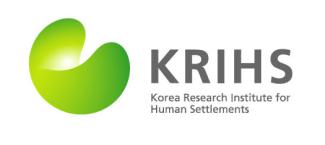GLTN Partner
Korea Research Institute for Human Settlements (KRIHS)
The Korea Research Institute for Human Settlements is committed to enhancing the quality of life and well-being of the Korean people through spatial planning studies and policy suggestions. It has carried out studies on the efficient use, development, and conservation of territorial resources. Its research areas range from sustainable and balanced territorial development and conservation of the territory to the provision of housing and infrastructure.
Founded in 1978, KRIHS has played a pivotal role in national territorial policy development with research in balanced national development, housing stability, infrastructure development and geospatial information system. The policies KRIHS developed and suggested have contributed to enhancing the quality of life of the people. Korea is facing rapid changes and challenges such as IT and high-tech development, climate change, low growth, low birth rate and an aging society. KRIHS performs research that deals with the emerging issues and tackles the challenges. Practical and field-focused research conducted influence people’s day-to-day lives and make their lives better. KRIHS shares Korea’s development experience with developing countries and expands global cooperation with international organizations, making KRIHS a top-notch global rather than simply a domestic think tank. Strengthening communication with the Korean public and expanding inter-institutional networks with global and domestic clients broadens KRIHS’ innovative research on the basis of fusion and convergence.
KRIHS was established as a non-profit research organization to: 1) formulate long-term national and regional development plans; 2) carry out studies to promote the efficient use and preservation of land resources; 3) conduct policy research focused on critical human settlement issues such as urban affairs, residential settlement, land use, the construction industry and infrastructure; 4) facilitate and promote private investment in infrastructure facilities; 5) systematically develop and manage a databank containing up-to-date information on national land resources; 6) provide training programs for human settlement management and planning professionals; and 7) exchange scholarly information with other professional organizations in and out of the country.

